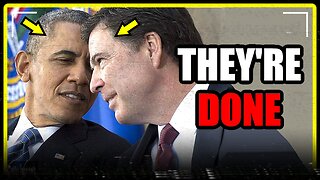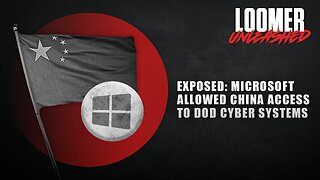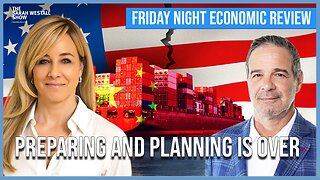Premium Only Content

China calls Taiwan's 2024 election a choice between peace and war. Here's what to know.
China calls Taiwan's 2024 election a choice between peace and war. Here's what to know.
By Elizabeth Palmer, Lucy Craft
January 12, 2024 / 7:34 AM EST / CBS News
Taipei, Taiwan — On Saturday, the people of Taiwan will elect a new president. For weeks, the leading candidates have staged boisterous campaign rallies across the small island off China's east coast. Addressing cheering supporters, they've made promises, ridiculed the opposition and worked the crowds — all visible proof of Taiwan's vibrant, thriving democracy.
But one sobering presence loomed large over the campaign: Chinese President Xi Jinping.
Xi claims Taiwan belongs to China, and he's vowed to assert control over it — leaving open the option of using force. In his 2024 New Year's address, he insisted that reunification after more than seven decades was a "historical inevitability."
As Taiwan's strongest ally, the U.S. is watching both the election and China's rhetoric very closely.
What to know as the U.S. grapples with soaring China-Taiwan tension
"Every election in Taiwan is significant because of the potential for Beijing reacting in a way that could contribute to further instability in the region," Taipei-based political analyst Michael Cole told CBS News.
At a meeting between Presidents Biden and Xi in the U.S. last fall, the Chinese leader called Taiwan "the biggest, most potentially dangerous issue in U.S.-China relations" and said he would prefer a peaceful reunification, but again refused to rule out the use of force, according to a U.S. official's account of the conversation.
Who is running in Taiwan's election?
Taiwan's presidential race pits current Vice President Ching-te Lai, 64, a Harvard-educated physician-turned-politician who also goes by William, against challenger Hou Yu-Ih, a former police officer of the conservative Kuomintang party.
Ahead of Taiwan presidential election 2024
Democratic Progressive Party (DPP) presidential candidate Lai Ching-te holds a campaign rally in Taipei, Taiwan, Jan. 11, 2024, ahead of the presidential election scheduled for January 13, 2024.
MAN HEI LEUNG/ANADOLU/GETTY
There's also a dark horse rival, Ko Wen-Je, a former mayor of Taipei, of the Taiwan People's Party.
It's a close race, but before polling was suspended more than a week before the vote, as required by Taiwanese law, Lai's ruling Democratic Progressive Party (DPP) was running a few points ahead of its rivals.
Where the candidates stand, and China's warning
All the parties advocate different approaches to dealing with Beijing.
The Kuomintang favors dialogue and closer but unspecified ties with China in order to avoid a war, but none of the parties support a reunification that would see Taiwan swap its democracy for Beijing's one-party communist rule. That reflects the conviction of an overwhelming majority of the Taiwanese people.
"Hong Kong's experience in recent years is something that the Taiwanese most assuredly do not want for themselves," said Cole, of the International Republican Institute in Taipei.
Supporters of all parties in Taiwan, Cole said, "have this thing in common called freedom and democracy."
About 200 miles south of the capital, two military veterans monitor the skies above the island, tracking the planes of Taiwan's military as they roar overhead — along with radio chatter from Chinese pilots who fly their fighter jets close to, or into Taiwanese airspace.
"They think Taiwan is part of their country, that the airspace in the Taiwan Strait and to the east of Taiwan are part of their territory," Taiwan Air Force veteran Eric Chan, a 55-year-old YouTuber, told CBS News.
Chan and his fellow vloggers said the Chinese flights were intimidation meant to influence voters to cast ballots for Taiwanese politicians who favor closer ties with China.
China accuses frontrunner Lai and his DPP, which has governed Taiwan for the last eight years, of promoting separatist sentiment in Taiwan.
If Lai wins, China's government warned Thursday that he "would continue to follow the evil path of provoking 'independence,'" taking Taiwan "ever further away from peace and prosperity, and ever closer to war and decline."
"China meddles every time Taiwan holds elections, but this time it is the most serious we have ever seen," said Lai in the runup to the election. "No matter if it is propaganda or military intimidation, cognitive warfare or fake news, they are employing it all."
The risk of war in the Taiwan Strait
While Xi has threatened to use force to reunify China and Taiwan, the plane watchers wryly dismiss the prospect - while making it clear they would never accept being ruled by the authoritarian Chinese Communist Party.
"I've got a joke for you," says radio afficionado Robin Hsu, 52, who blogs on Facebook. "In Taiwan, the people are free to criticize the president. And in China, the people are also free to criticize the president — of Taiwan."
Untold numbers of military aircraft now patrol the Taiwan Strait that separates the island from China — not just from China and Taiwan, but from the militaries of the U.S., Japan, Australia and other countries. Tense encounters, with accusations of "trespassing," have become a more common occurrence.
YouTuber Chan said that was making a potentially disastrous mid-air miscalculation ever more likely, "because if any one side fails to control themselves, then it might lead to a war."
"Trusting in Taiwan or trusting in Xi"
In the days ahead of the election, in Miaoli, southwest of capital Taipei, several thousand of the ruling DPP party's faithful crowded into a public park, where workers had neatly arranged rows of red plastic stools. As bombastic music filled the town square, they politely waved flags reading: "Choose the right person, walk the right path."
wm-lai-rally.jpg
Supporters of Taiwan's ruling DPP party hold a rally for the party's presidential candidate, Lai Ching-te, in Miaoli, southwest of Taiwan's capital Taipei, days before Taiwan's Jan. 13, 2024 presidential election.
LUCY CRAFT/CBS NEWS
Of course, this election is about local issues — from the cost of housing to better care for the elderly. But underpinning it all is Taiwan's relationship with China.
"It's a choice between choosing a president, as opposed to a chief executive like Hong Kong has had to do," said Lai. "Embracing the world or staying hemmed in by China. Trusting in Taiwan or trusting in Xi."
No matter which party wins, the Taiwanese will not be voting to trust in Xi.
-
 1:54:03
1:54:03
EVERYDAY NEWS
11 months agoBassem Youssef & Theo Von - Hilarious Podcast Exchange!
192 -
 9:43
9:43
MattMorseTV
5 hours ago $2.32 earnedTulsi just DROPPED a BOMBSHELL.
12.3K31 -
 LIVE
LIVE
SynthTrax & DJ Cheezus Livestreams
14 hours agoFriday Night Synthwave 80s 90s Electronica and more DJ MIX Livestream Knight Ride Edition
212 watching -
 2:31:18
2:31:18
Laura Loomer
5 hours agoEP134: EXPOSED: Microsoft Allowed China Access To DOD Cyber Systems
137K55 -
 2:46:43
2:46:43
FusedAegisTV
6 hours agoRumble Smackdown! #004 Tekken 8 $100+ Online Tournament !bracket !prizepool
17.9K -
 1:53:41
1:53:41
The Mike Schwartz Show
10 hours agoTHE MIKE SCHWARTZ SHOW Evening Edition 07-18-2025 with guest Congressman Buddy Carter!
27.6K25 -
 LIVE
LIVE
DopeFrags
8 hours agoOne of the best survival games ever? | Grounded
24 watching -
 1:03:43
1:03:43
Sarah Westall
4 hours agoPlanning is Over, War has Started: First Stage of Economic Global War: Commodities w/ Andy Schectman
19.9K1 -
 LIVE
LIVE
Fragniac
4 hours ago( -_•)╦ ╤─💥 MAKING GAMING GREAT AGAIN w/ The @BrrrapPack 🎮❗
14 watching -
 58:41
58:41
BonginoReport
10 hours agoTrump Impersonations & Friday Fun w/ Shawn Farash - Nightly Scroll w/ Hayley Caronia (Ep.93)
87.4K26